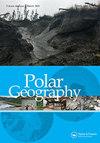比较北极和第三极最近的变化:科学与政策的联系
IF 1.6
Q3 GEOGRAPHY, PHYSICAL
引用次数: 0
摘要
科学的快速发展迫使以知识为基础的政策更新,特别是在寒冷地区。在经历了重大气候变化的北极和喜马拉雅地区,科学知识与政策实践之间存在脱节。气温上升、冰雪减少、降水和塑料废物污染物增加,以及通过接收来自大西洋的更温暖、更咸的水而使北冰洋大西洋化,这些都需要科学研究问题来加强科学与政策之间的联系。北极的放大可以通过海洋和大气的遥相关对地球其他地区产生遥远的影响。因此,研究人员需要在北冰洋以及与第三极——喜马拉雅山脉的联系上,通过多学科和合作的方法来推动科学发现的前沿。本文的总体目标是探讨北极和第三极的比较对理解这个人为气候变化时代的北极和全球生物地球物理过程的价值;在北极科学研究及其与社会的相关性之间建立强有力的联系;并帮助推动北极、第三极和全球更可持续的未来。本文章由计算机程序翻译,如有差异,请以英文原文为准。
Comparing recent changes in the Arctic and the Third Pole: linking science and policy
ABSTRACT The rapid evolution of science compels renewal of a knowledge-based policy, particularly in cold regions. In the Arctic and Himalayas, which have undergone a significant climate change, there is a disconnect between scientific knowledge and the practices of policy. The rising air temperatures, decreasing ice and snow, increasing precipitation and plastic waste pollutants and the Atlantification of the Arctic Ocean by receiving warmer and saltier water from the Atlantic Ocean call for scientific research questions to strengthen the linkage between science and policy. The Arctic amplification can have remote impacts on other parts of the globe through oceanic and atmospheric teleconnections. Hence, researchers need to push the frontiers of scientific discoveries through multidisciplinary and collaborative approaches in the Arctic Ocean along with connections to the Third Pole – Himalayas. The overall objectives of this paper are to explore how a comparison of the Arctic and the Third Pole is valuable for understanding the Arctic and global biogeophysical processes in this epoch of anthropogenic climate change; provide a strong linkage between the Arctic scientific research and its relevance to society; and help advance a more sustainable future for the Arctic, the Third Pole and the globe.
求助全文
通过发布文献求助,成功后即可免费获取论文全文。
去求助
来源期刊

Polar Geography
GEOGRAPHY, PHYSICAL-
CiteScore
5.30
自引率
0.00%
发文量
13
期刊介绍:
Polar Geographyis a quarterly publication that offers a venue for scholarly research on the physical and human aspects of the Polar Regions. The journal seeks to address the component interplay of the natural systems, the complex historical, political, economic, cultural, diplomatic, and security issues, and the interchange amongst them. As such, the journal welcomes comparative approaches, critical scholarship, and alternative and disparate perspectives from around the globe. The journal offers scientists a venue for publishing longer papers such as might result from distillation of a thesis, or review papers that place in global context results from coordinated national and international efforts currently underway in both Polar Regions.
 求助内容:
求助内容: 应助结果提醒方式:
应助结果提醒方式:


